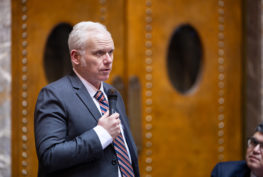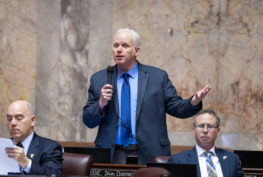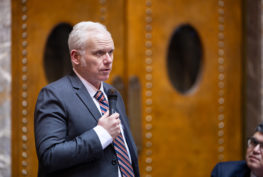OWashington consumers would continue to be protected from being overcharged for everyday products under legislation awaiting a hearing before the Senate Agriculture, Water, Natural Resources & Parks Committee chaired by Sen. Kevin Van De Wege (D-Sequim).
Senate Bill 5468 would update the fees the state charges for devices used to measure or weigh the vast range of products sold in Washington state, from household items like meat and produce to commercial items like gasoline and freight.
“The biggest thing this does is make sure a gallon of gas is a gallon of gas,” said Van De Wege, the bill’s sponsor. “No one should receive less than what they pay for, whether intentionally or unintentionally.”
Scales and other commercial measuring devices used across the state are regularly inspected by state and local government employees to ensure the weights and other measurements they provide are accurate. This service is funded through a system of fees paid by the businesses that rely on the devices. Van De Wege’s bill would maintain the effectiveness and integrity of this regulatory standard by updating those fees to reflect the modern cost of inspections.
“Day in and day out, we buy everything from salmon to gasoline with the assurance that we aren’t being overcharged or shortchanged,” Van De Wege said. “This legislation simply enables the state to continue to provide the inspections necessary to ensure the accuracy of these millions of transactions.”
Another bill in Van De Wege’s committee, SB 5145, would prohibit the use of hydraulic fracturing — more commonly known as fracking — in the exploration or production of oil or natural gas in Washington state.
“We know that fracking produces tremendous amounts of polluted water and poses serious threats to human health,” said Van De Wege, a cosponsor of the bill. “Given the threats to human and environmental health, as well as the absence of evidence that there is even any frackable oil in our state, it makes no sense to allow fracking anywhere in our state.”
He noted that a Princeton study, the largest ever conducted on health effects from fracking, found that pregnant women who live very close to a fracking well are more likely to give birth to a less healthy child with a low birth weight, which can result in poorer health throughout a person’s life.
“We have the great fortune to live in a region known for an abundance of impressive natural resources and environmental beauty,” Van De Wage said. “We should guard against any practices that would threaten these treasures, especially when we have better clean energy options available to us.”
SB 5145 was heard Tuesday and passed out of committee Thursday.




